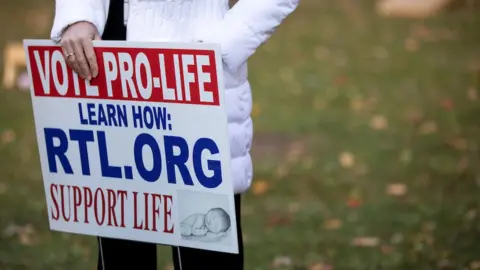After Kansas defeat, what's next for abortion bans?
 Reuters
ReutersThe votes are in, and Kansans have been unequivocal - the right to abortion in the state stays.
More than 900,000 Kansans - about a third of the state's total population - cast their ballots on Tuesday in a state-wide referendum on whether the right to abortion should be removed from the state's constitution. In the lead-up to the vote, many polls predicted a nail-biting race. But when it came down to it, almost 60% voted against the change, a resounding victory for pro-choice advocates.
The results will send ripple effects across the country in the months ahead, as more states hold their own referendums on abortion rights and as nationwide November elections loom.
When the US Supreme Court overturned Roe v Wade, it gave individual states the authority to ban abortion. Kansas is a stalwart "red" state, with a strong Republican base and a Republican government - if any state should be able to pass abortion restrictions, it's Kansas.
But because abortion rights are a part of the state's constitution, anti-abortion lawmakers decided to put it to a vote, in the hopes of paving the way for more restrictive laws.
That decision seems to have backfired. But while the battle to ban abortion in the state may have been lost, it continues in other states across the country.
- ON THE GROUND: The state where abortion is on the ballot
Legal scholar Naomi Cahn, co-director of the Family Law Center at the University of Virginia, said the Kansas vote, while obviously having a significant impact on women in the state, will also reverberate far beyond its borders.
"I suspect there will be similar initiatives across the country - either trying to enshrine the right, or trying to lose the right and get abortion banned," she told the BBC.
In total, 10 states have the right to abortion enshrined in their state constitutions, according to the Center for Reproductive Rights: Arizona, Alaska, Montana, Minnesota, Kansas, New Mexico, New Jersey, California, Massachusetts, and Florida.
Lawmakers in some of those states have said they want to ban abortions, despite their state constitutions, and, like Kansas, could put the matter to a vote.
Montana has already added abortion to the ballot for the November midterms. In Kentucky, the constitution does not guarantee the right to abortion, but state courts have played ping-pong with the state's strict abortion ban. Voters there will decide in November whether to amend the constitution to make it clear that abortion is not a right.
Conversely, some states, notably California and Vermont, are making moves to shore up abortion rights by having votes on adding additional abortion protections to the constitution.
The anti-abortion movement's failure in Kansas could give pause to other states considering similar referendums, said Kyle Kondik, a political analyst at the University of Virginia Center for Politics, especially if it could give pro-choice Democrats an edge by encouraging voters who support left-wing causes to show up to the polls.
"On this particular issue, Republicans, I think, have a pretty clear vulnerability," he said.
That vulnerability could have major consequences in Michigan, a so-called swing state where power frequently changes hands between the Democrats and the Republicans.
Pro-choice advocates garnered over 750,000 signatures to get abortion rights on the ballot in November. It's possible the issue could become a beacon for left-leaning voters, and influence not only the future of abortion rights in the state, but the political makeup up of the state legislature and its representatives in Congress.
Getting abortion rights on the ballot could become a political tactic for Democrats to try and increase their voter turnout, said Mr Kondik - but it's not guaranteed to be a slam-dunk come November.
"I think it's important to remember that often Democratic Party ideas are sometimes more popular than Democratic Party candidates," he said.
Just because people may show up to the polls to vote for abortion rights, does not mean they will necessarily vote for pro-choice candidates. In 2018, for instance, 37 states voted in favour of expanding Medicaid, a left-leaning issue, while many voters still backed conservative candidates for office, Mr Kondik said.
 Reuters
ReutersLawmakers who want to ban abortion, but don't want to risk political blowback, could let the issue be fought out in the courts. That's what Florida Governor Ron DeSantis has done so far, where a ban on most abortions after 15 weeks has been volleyed back and forth and is heading for the state's Supreme Court.
They could also wait until after November to put anti-abortion legislation on the agenda, and thus avoid tying their campaigns to a potentially unpopular idea.
Regardless of whether states put abortion on the ballot or not, it's clear it will be on voters' minds this autumn. A June poll from NPR/PBS NewsHour/Marist found that 56% of Americans were opposed to the Supreme Court decision to overturn Roe v Wade, while 40% supported it. In the same poll, 51% said they are likely to vote for a congressional candidate who would restore abortion rights, while 36% said they would deliberately vote against a candidate who had that intent.
Will voters support the Supreme Court ruling that abortion isn't a guaranteed right? Time will tell, but as the results from Kansas indicate, the court of public opinion can be unpredictable.
